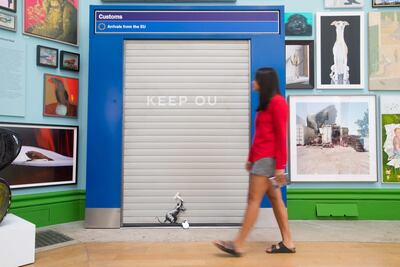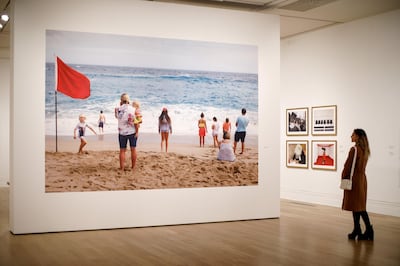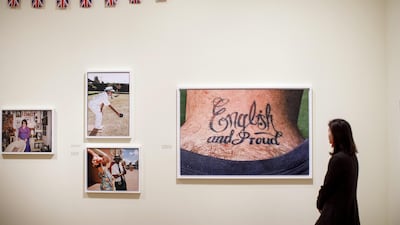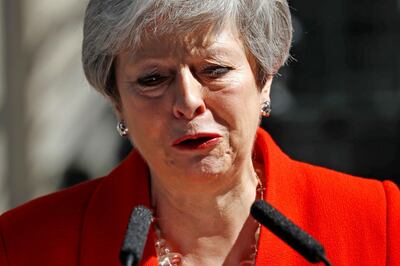In 1993, the UK's prime minister at the time, John Major, made a speech to the Conservative Group for Europe in which he asserted strongly that Britain had a central role in Europe, politically, economically and culturally. The country's historic animosities with the continent and the isolationist mentality of "Little England" were things of the past, he said. He also spoke of the perseverance of British cultural identity and the nation's ability to withstand the buffeting winds of globalisation.
"Fifty years from now Britain will still be the country of long shadows on county [cricket] grounds, warm beer, invincible green suburbs, dog lovers and pools fillers and, as George Orwell said, 'old maids bicycling to Holy Communion through the morning mist'. Britain will survive unamendable in all essentials," Major said.
The dual message was clear: British traditions and culture were a permanent fixture, even while the country was becoming part of a much larger group of nations. But more than a quarter of a century after Major made that speech, Britain has shown itself, like all places, to be entirely amendable. Perhaps the only cultural marker from Major's list that still holds up is British people's obsession with their pets.
The resignation last month of prime minister Theresa May was set against the backdrop of a rather more significant failure in Major's medium-term forecasting: Britain's place "at the heart of Europe". The Brexit morass has forced two Conservative prime ministers to leave office in three years – David Cameron resigned after the result of the Brexit referendum was announced in 2016 – and with the deadline for Britain's exit from the EU postponed until October 31 this year, almost all other parliamentary activity has ground to a halt.
The young British rappers speaking out
While such a wearying stalemate has become the norm at the executive level, it has fallen to Britain's writers, artists, musicians and other cultural figures to try to make sense of the shift in the country's relationship with its neighbours and what that says about the British psyche today. If Britain is not an everlasting national everyman, as Major imagined, and British people are not personified by a suburban chap sipping on warm drinks while watching the cricket, then where does the country turn?
British rapper Slowthai released his bleak but funny debut album, Nothing Great About Britain, last month and its provocative title made big waves. Sure enough, it describes a country of marginalised young people, impoverished families scraping by, petty crime and social decay. The album was also accompanied by a billboard advertising campaign that quoted statistics suggesting hate crime and police racism is on the rise in Britain. His message is certainly resonating with listeners and Nothing Great About Britain entered the charts in the top 10.
Slowthai announced his Brexit Bandit tour last year and told The Fader magazine there was a "caveman mentality" and a racist undertone to the Leave vote, with people wary of non-British residents "taking our jobs". "My dad don't even go out and try to apply for a job, so how can someone take his job?" he quipped. "You can't complain about someone who's travelled to get somewhere they can prosper and do something for their family."
Another young rapper, Dave, also paints a bleak picture of inequality and alienation in Britain's big cities in his debut album Psychodrama, which was released in March. Like Slowthai, Dave voted Remain, because of the much-lauded work of the European Court of Human Rights.
How other artists have responded
From the referendum campaign onwards, artists have been keen to involve themselves in the debate, such as Wolfgang Tillmans and Antony Gormley, who designed Remain posters that emphasised the idea that multiculturalism means supporting more porous borders and identities. Tillmans is German, but much of his work has been exhibited in Britain. Last week, as May prepared to step down, the Royal Academy's summer exhibition launched with a piece by Banksy, called Keep Ou, featuring a rodent hammering shut an airport customs entrance to arrivals from the EU. Filmmakers sprang into action, too. The first feature film about the campaign – Brexit: The Uncivil War, which starred Benedict Cumberbatch – was released in January.

While creatives may be keen to address Brexit and its implications, they're not split evenly between Leave and Remain. A survey carried out by the Creative Industries Federation before the referendum found 96 per cent of its members backed Remain. Actors John Cleese and Michael Caine, and The Who lead singer Roger Daltrey, are among the big names from the British arts world that back Brexit. Daltrey compared the EU to the Mafia and was keen to emphasise that xenophobia did not motivate him to vote Leave. "I'm not anti-Europe, I'm anti-Brussels, but people don't get the distinction," he told The Telegraph in 2018.
Artists for Brexit
Last year, a group of creatives who backed a Leave vote established Artists for Brexit. Manick Govinda, the organisation's co-founder and a visual arts producer, expressed his concerns at the group's first meetings at a pub in north London. "We are the four per cent in the cultural sector. Maybe there is slightly more, we don't know," he told The Times last year.

He said the belief that Brexit supporters are "racist" or "little Englanders" was a "terrible stereotyping of the 17.5 million people who voted to leave". "People are worried they may not get work, their names may get dropped from commissions or galleries. We hope now that others may come out of the closet," Govinda added.
There are those artists whose views on Brexit are polar opposites, but there are also plenty that lie somewhere in between. Rather than taking advocacy positions for one side or the other, some of the most exciting work being produced has not sought to argue the case for or against leaving the EU, but to document British people in the age of Brexit. An exhibition held from March until May this year at London's National Portrait Gallery featured the work of Martin Parr, one of Britain's most respected documentary photographers, and devoted a large section to British eccentricity, identity and society, through portraiture of its people
Only Human: Martin Parr was brimming with bold, striking images. Parr is interested in social class and its divisions, and he appears to skew towards the extremes in his depiction of those who voted Leave. Reflecting Major's impressions of his countrymen, the upper-class pursuits of the Henley Royal Regatta, the members' area at Lord's Cricket Ground, fox hunting and bowler hats were all captured by Parr and contrasted with images of car boot sales, cheap biscuits, fishermen and tattooed revellers with their shirts off. "The vote was really an act of defiance against the southern elite, delivered by the people who probably will be most damaged by the result," Parr told The Guardian in 2017.
So what next?
No matter what side of the fence these artists sit on, a lot of the most interesting work about Brexit seeks to explain and understand deep-set feelings about Britain's identity amid the political uncertainty. In James Meek's latest book, Dreams Of Leaving and Remaining, he explores the slow-moving processes behind the sudden shock of the Brexit vote by getting out and about in Britain, to look beyond London at the competing ideals that led to this culture clash – cosmopolitanism and urbane liberalism against a more traditional yearning for British sovereignty, its mythology and nostalgia.

Meek explains the ideology of the Brexiteers in terms of the national myth of St George slaying the dragon, a story in which the knight frees a village from an evil beast's oppression through sheer bravery.
Before the referendum, people were sold the idea that Brexit was something straightforward; quick, easy, heroic and liberating. Many ate it up. About three years after the vote, with no end in sight, this myth appears to be about as accurate as Major's assertion that Britain would be at the heart of Europe for ever.


